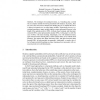Free Online Productivity Tools
i2Speak
i2Symbol
i2OCR
iTex2Img
iWeb2Print
iWeb2Shot
i2Type
iPdf2Split
iPdf2Merge
i2Bopomofo
i2Arabic
i2Style
i2Image
i2PDF
iLatex2Rtf
Sci2ools
CP
2007
Springer
2007
Springer
Limitations of Restricted Branching in Clause Learning
The techniques for making decisions, i.e., branching, play a central role in complete methods for solving structured CSP instances. In practice, there are cases when SAT solvers benefit from limiting the set of variables the solver is allowed to branch on to so called input variables. Theoretically, however, restricting branching to input variables implies a super-polynomial increase in the length of the optimal proofs for DPLL (without clause learning), and thus inputrestricted DPLL cannot polynomially simulate DPLL. In this paper we settle the case of DPLL with clause learning. Surprisingly, even with unlimited restarts, input-restricted clause learning DPLL cannot simulate DPLL (even without clause learning). The opposite also holds, and hence DPLL and input-restricted clause learning DPLL are polynomially incomparable. Additionally, we analyse the effect of input-restricted branching on clause learning solvers in practice with various structural real-world benchmarks.
| Added | 07 Jun 2010 |
| Updated | 07 Jun 2010 |
| Type | Conference |
| Year | 2007 |
| Where | CP |
| Authors | Matti Järvisalo, Tommi A. Junttila |
Comments (0)

